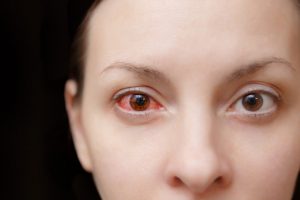 You’ve probably heard about rosacea of the skin but may not be aware that there is a similar condition that can affect the eyes. Redness, burning, and itching of the eyes can sometimes be diagnosed as ocular rosacea.
You’ve probably heard about rosacea of the skin but may not be aware that there is a similar condition that can affect the eyes. Redness, burning, and itching of the eyes can sometimes be diagnosed as ocular rosacea.
It’s a form of inflammation that often occurs in people who suffer from the chronic skin condition rosacea. In some cases, red, itchy eyes are the first sign that you will one day develop facial rosacea.
Advertisement
While there is no easy cure for rosacea, good eye care can help control it and prevent it from recurring after it goes into remission.
What Are the Causes of Ocular Rosacea?
Ocular rosacea is pronounced roe-ZAY-she-uh and usually affects adults between 30 and 50 years old.
Rosacea research is ongoing. However, when it comes to ocular rosacea causes, we know that the following factors can be involved:
- Family history (hereditary)
- Environmental factors
- Eyelash mites
- Bacterial involvement
- Blood vessel problems
- Blocked glands in the eyelids
Researchers have found that about 85 percent of people with ocular rosacea have blocked glands around the edges of their eyelids. When this happens, the area around the eye swells and becomes irritated.
For some reason, people who are fair-skinned are more likely to get rosacea.
Signs and Symptoms of Ocular Rosacea
Symptoms of ocular rosacea vary from person to person in terms of the level of severity. Symptoms can appear before skin rosacea, after, or even around the same time. The list below includes the most common ocular rosacea symptoms:
- Dry eyes
- Redness
- Burning in the eye or eyes
- Itchiness in one or both eyes
- A feeling of grittiness in the eye or eyes
- Blurred vision
- Sensitivity to light
- Dilated small blood vessels on the white of the eye
- Red, swollen eyelids
- Tearing
Sometimes, ocular rosacea symptoms are not at the same level of severity as the skin rosacea symptoms.
Risk Factors for Ocular Rosacea
Data tells us that skin rosacea affects more women than men, but that ocular rosacea affects men and women equally. Some studies indicate that people who blush easily may be more prone to develop eye symptoms.
Complications of Ocular Rosacea
Ocular rosacea can affect the surface of the eye, which is called the cornea, when you have dry eyes. This is not only irritating; it can lead to visual symptoms. The irritation can lead to inflammation of the eyelids, which can then cause secondary irritation of the cornea. The bottom line is that complications involving the cornea can cause loss of vision.
Lifestyle Tips and Home Remedies for Ocular Rosacea
Advertisement
If you’re diagnosed with ocular rosacea, there are steps you can take to help control it. Living an ocular rosacea lifestyle means not letting the rosacea get out of control by ignoring it. There are various ocular rosacea home remedies. In fact, many doctors will suggest you start treatment with simple at-home care. Below you will find some ocular rosacea natural treatment tips.
- Clean eyelids twice a day: Dipping a cotton swab in warm water and moving it across your eyelid can help remove any debris or oil from the eye area.
- Apply a warm compress: You can loosen blocked glands by soaking a washcloth in hot water, wringing it out, and then placing it over your closed eyes for 5 to 10 minutes.
- Avoid makeup: When a flare-up occurs, avoid makeup or using facial products that have skin irritants in them, such as fragrances. Most people find that when the flare-up subsides, they can start using non-comedogenic makeup.
- Use glasses over contact lenses: When eyes are irritated, it’s best to avoid using contact lenses. When the flare-up ends, you’ll likely be comfortable enough to return to using lenses.
- Avoid hot, spicy foods: For many people, eating hot, spicy foods can trigger rosacea.
- Limit alcohol consumption: Alcohol is another potential trigger for rosacea. Limit yourself to one to two drinks per week if alcohol tends to cause flare-ups.
- Limit sun exposure: Use a hat, sunscreen, and wear glasses when you are exposed to the sunlight. It is a common trigger of rosacea symptoms. You should also avoid sun-tanning beds.
- Consume flaxseed: Research has suggested that consuming flaxseed oil can help reduce rosacea flare-ups. Health food stores and some grocery stores carry flaxseed oil, flaxseed supplement capsules, or whole flaxseed. Try consuming two to three teaspoons of flaxseed oil each day.
- Use artificial tears: These can help relieve the dryness in your eyes. However, it is best to consult with a doctor about the type of eye drops and how often you should use them.
If you are diagnosed with rosacea, you need to recognize that it is a chronic condition. In other words, there is no quick cure and it will recur even though you experience periods of remission. It is comforting to know that when you do have flare-ups, there are a variety of remedies you can try to help bring it back under control.
Also read:
- Top foods to boost your eyesight and vision
- Yoga for eyes: Easy eye yoga poses to improve vision
- Home remedies to improve vision and eye health
